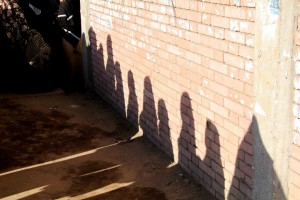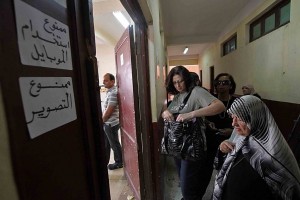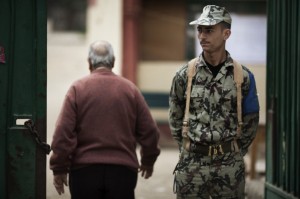
Mohamed Omar
Egyptians first boycotted an election as far back as 1926. In 1924 the government, composed by Al-Wafd, the majority party in parliament at the time, resigned in protest of British policies regarding the Sudan.
King Fouad instead appointed a loyalist prime minister and government who could not get much done due to opposition from the parliamentary majority. He then dissolved parliament and called for new elections.
Meanwhile, the government altered the election law and embarked on severe electoral redistricting to circumvent an Al-Wafd majority. They failed and Al-Wafd won again; so the king dissolved parliament a second time.
Al-Wafd then met with the two other major parties and collectively threatened to boycott the next election. Seemingly unfazed at first, the government relented in the face of the popularly backed movement and restored the original election law. Al-Wafd ran in a coalition with two other parties and won, forming a national coalition cabinet.
Today, the National Salvation Front (NSF), Egypt’s largest opposition bloc, is calling for a boycott of the upcoming parliamentary elections in the face of what they see as attempts by President Mohamed Morsi and the ruling Muslim Brotherhood to highjack the political process.
History is very unlikely to repeat itself.
Reasons to boycott the election
Boycotting an election usually happens for one of two reasons, if not both: either the opposition views the regime managing the elections as illegitimate or does not trust that the elections will be free and fair.
The NSF repeatedly demanded certain guarantees of fairness in order to participate in the election and threatened to boycott if these guarantees were not met.
Opposition groups demanded Morsi remove Prosecutor General Tala’at Abdallah, who he appointed unilaterally in November, as well as form a constitutional review committee tasked with amending the constitution.
NSF leaders also declared their opposition to the Shura Council-drafted parliamentary election law under which the House of Representatives elections will be governed.
Government supporters blame the NSF for repeatedly refusing to take part in the national dialogue with the presidency before its discussion and drafting by the Shura Council, despite the fact that the opposition had clear demands in order to join and it was the presidency that insisted dialogue be unconditional.
Furthermore, the NSF made their vision for an election law clear and called on the Shura Council to draft a new election law that guarantees national and international NGO monitoring, proper judicial oversight, and a fair division of districts.
According to the NSF the resulting bill included none of this; proper national and international NGO monitoring is still suspect, nothing was mentioned in the law on the use of houses of worship and religious rhetoric for campaigning, and it does not guarantee a specific number of judges needed to monitor a polling station.
More tellingly, the law came out differently from what the parties that did join the national dialogue, most notably the Salafi Al-Nour Party, had agreed to with the presidency and ruling Freedom and Justice Party (FJP).
As outlined in the new constitution, the Shura Council then sent the bill to the Supreme Constitutional Court to check its constitutionality. The court deemed a number of articles in the election law as unconstitutional and returned the draft to the council for amendment.
The court recommended the inclusion of a female quota on party lists requiring there be at least one female candidate on each list, a revised definition of workers and farmers for which half of the House of Representatives seats are reserved, prohibition of elected members of parliament from changing their party affiliation, and redistricting voting boundaries and adding more seats.

Hassan Ibrahim
Although the Islamist-dominated council adopted these recommendations, it did not run the bill by the Supreme Constitutional Court again and passed it immediately before handing it over to Morsi who signed it into law.
Some experts argue that this opens up the possibility for the court to declare the elections to be unconstitutional and dissolve the elected lower house as it did last year.
Furthermore, despite adding more seats and redistricting as per the court’s recommendation, the opposition still argues that some districts are too big or divided in ways that favour the Muslim Brotherhood.
The predominantly Christian area of Shubra, for example, has been included in a redrawn large district with Muslim majority areas in what the opposition says is a deliberate attempt to prevent Christian or secular candidates from getting elected. The same scenario was seen in Heliopolis.
The election law, which Morsi is again calling for national dialogue on despite already signing it and announcing election dates, is not the NSF’s only gripe with the process.
Opposition leaders have also repeatedly called on Morsi to dismiss Prime Minister Hesham Qandil’s government and appoint a “nonpartisan national salvation” cabinet instead.
They argue that Qandil’s cabinet could not be counted on to run the elections fairly. The Muslim Brotherhood and the Freedom and Justice Party argue that the cabinet does not handle the elections and that they are formally run by the Supreme Electoral Commission. The Ministry of Interior, however, is responsible for securing the elections.
Brotherhood officials also say that the Qandil cabinet is neutral since no political parties dominate it and most ministers in it are independent.
This is only true at face value. Despite not having a majority of the cabinet, the Brotherhood’s influence over cabinet members responsible for running and monitoring elections is evident.
Minister of Interior Mohamed Ibrahim is not a Brotherhood member but has shown himself to be more likely to follow orders than his predecessor as evidenced by his crackdown on anti-Brotherhood and Morsi protests. The same can be said for Minister of Justice Ahmed Mekki.
Official Brotherhood members lead the Ministries of Information, which controls state media; Supply and Domestic Trade, in charge of handing out subsidised goods; and Local Development which administers local government.
While the presidency and ruling party argue that this cabinet’s days are numbered anyway saying a new one will be formed after the elections, this point ignores the NSF’s demand to postpone the elections. Opposition leaders argue that the state of civil disobedience and violence across the country calls for a delay in the poll.
Finally, many in the opposition, especially its youth, argue that participating in the elections means admitting the newly adopted constitution’s legitimacy, since the elections are scheduled and governed by articles within the new constitution.
Furthermore, many view Morsi himself as lacking legitimacy since his November 2012 constitutional decree that gave him sweeping powers, especially over the judiciary, followed by his push to pass an Islamist constitution. Participating in these elections is an admission of his legitimacy.
It is doubtful that participating would even yield tangible results; according to a recent Baseera Centre poll, only 65% of Egyptians even know of the NSF and of those who do, only 35% support it.
This translates into the opposition counting on a core support base of 22% of the population. In last year’s parliament, secular parties also commanded about a quarter of seats in parliament and thus were not able to push through any legislative agenda on their own or even challenge legislation from a united Islamist majority.
Can a boycott work?
A 2009 study by the Brookings Institute revealed that while threats of a boycott, backed by popular support, can yield major concessions from the regime, boycotting an election almost always brings disastrous consequences upon the opposition.
Time and time again in Venezuela, Afghanistan, Zambia, and Lebanon boycotts have backfired on opposition groups or minorities. A strong boycott movement needs popular support. Those who call for boycott hope voters do not turn up and thus the regime is internationally embarrassed and appears to lack legitimacy to their own people.

AFP Photo / Khaled Desouki
While it is true that participation levels have decreased recently in post-revolutionary Egypt, many account this to voters’ increasing apathy and pessimism in the system. The National Salvation Front has constantly said that it does not command the street, but is driven by it.
Morsi and the Muslim Brotherhood have dismissed this decrease in voter turnout several times. Morsi won the presidency by a 51% majority in an election in which only half of registered voters participated. However, he continually claimed a strong popular mandate.
Similarly, the Shura Council, currently entrusted with legislative authority, was elected by 7% of the electorate while the newly adopted constitution passed in a referendum in which only one-third of the electorate participated.
Boycotting the lower house elections will likely yield a similar result, allowing the Brotherhood will to control the legislative agenda and form an FJP cabinet.
The lack of NSF presence is also unlikely to succeed in making the parliament appear rubber stamp. While the NSF had been calling for protests and boycotts, the Salafi Al-Nour Party cemented its status as a strong opposition party.
Initially viewed as a Brotherhood ally with their collaboration on the constitution and support of Morsi during the presidential election, Al-Nour have since come out looking as an effective opposition group to the government.
The party called Morsi and the FJP out on issues such as taking over the civil service, loans and other economic policies. They even attempted to mediate dialogue between the presidency and the NSF.
If secularists boycott these elections, Al-Nour will be a strong option for those who do not want to elect the FJP candidates, especially voters who are not necessarily secular but have lost faith the brotherhood.
The Salafis, especially Al-Nour, will capitalise on the “with Islam, against the Brotherhood” vote and will have a strong presence in parliament as the opposition, assuming the FJP wins, thus refuting allegations of a rubber stamp parliament.
A boycott would leave the NSF firmly locked out of the political system, forcing them to either completely fade away from public life or to employ other methods.
NSF leaders have been quick to declare support for the growing civil disobedience movement against Morsi. This, combined with the boycott, suggests they are aiming to oust Morsi or at least force him to reform through street action.
Easier said than done.
Unlike former President Hosni Mubarak, Morsi has a popular base in the form of the Muslim Brotherhood and its supporters, a sizable and much organised segment of the population who have already demonstrated they are willing to fight for him.
Brotherhood supporters have already attacked anti-Morsi demonstrations and sit-ins before. Additionally, Morsi is still an elected president, and many would not be in favour of his ouster purely on that basis.
One remaining option would be a military coup. As the Port Said and Nasr City pro-military protests demonstrated, there is a segment of society in support of this option. However, NSF leaders have more to lose than gain by supporting the military.
Doing so would first and foremost alienate their base; revolutionary youth, some of them members of their own parties and all who view the military to be just as bad, if not worse, than the Muslim Brotherhood. Furthermore, NSF would lose all domestic and international legitimacy if it called for a military coup against an elected president.
More importantly, however, a coup against Morsi is not in the military’s interest. Following the retirement of members on the Supreme Council of the Armed Forces and the appointment of General Abdul Fatah Al-Sisi as the new defence minister, the military was able to secure all of its interests in the new constitution.
Since transferring power to Morsi following his election, the military’s reputation seems to be healing amongst most of the general population, which contrasts with that of the Muslim Brotherhood. A return to power would see the generals blamed for the security and economic issues Egypt is facing, a burden they have no reason to bear.

AFP Photo / Marco Longari
While unlikely to succeed in their goal, the residents of Port Said collecting signatures for military rule and even declaring Al-Sisi president of an independent Port Said state is revealing to Egypt’s current state of affairs. What is more telling is Al-Sisi’s condemnation of such actions and insistence that the military respects Morsi’s legitimacy as president.
The consequences of boycotting
The boycott could go further than just locking NSF out of political life; it could very well destroy it internally. Not all parties making up the Front are happy with the decision.
The Egyptian Social Democratic Party for instance expressed its displeasure at the boycott option. However, it has since said it would fall line with the NSF.
Other less than revolutionary parties might not follow suit. When Nobel laureate Mohamed ElBaradei called for a boycott of the 2010 parliamentary elections in order to embarrass Mubarak’s ruling National Democratic Party, several parties heeded the call.
Others, like the Al-Wafd and Tagammu parties, however, participated anyway and ended up gaining less than a dozen seats between them. This situation was hopeless to many, anyhow, but for these coming elections, several parties are convinced of their increased chances of gaining seats due to the growing popular discontent with the Muslim Brotherhood.
If several parties break rank and participate in the elections despite the front’s announcement, then the entire point of boycotting the elections will be gone. Secular opposition participation will add legitimacy to the elections, and NSF will lose all remaining credibility.
The NSF breaking apart is the least of the boycott’s potentially disastrous consequences. If the Muslim Brotherhood is able to secure a clear majority in the House of Representatives they will dominate both houses of parliament and will be free to fast track their legislative agenda.
They will also gain the right to form a Freedom and Justice Party government composed entirely of FJP ministers and a prime minister of their choosing. Under the new constitution the prime minister shares executive power with the president.
Since they already have the presidency and Shura Council, an election victory would put the Brotherhood in control of all branches of government for the next four years. This, in addition to a sympathetic prosecutor general giving them a foot inside the judiciary, would mean total political domination by the Brotherhood.
Yet participation is not much better either. At this point, even if the NSF participated in the elections, their victory is highly unlikely. Their best chance would be to at least control more than a third of the seats to influence legislation or participate in government but even that is difficult.
Boycotting these elections with the hope of another popular revolt ousting Morsi seems like the idealistic solution but it is indeed just that. The likelihood of another uprising large enough to remove him from power is low and that of a military coup is even lower.
For the National Salvation Front, this is a clear case of damned if you do, damned if you do not.




